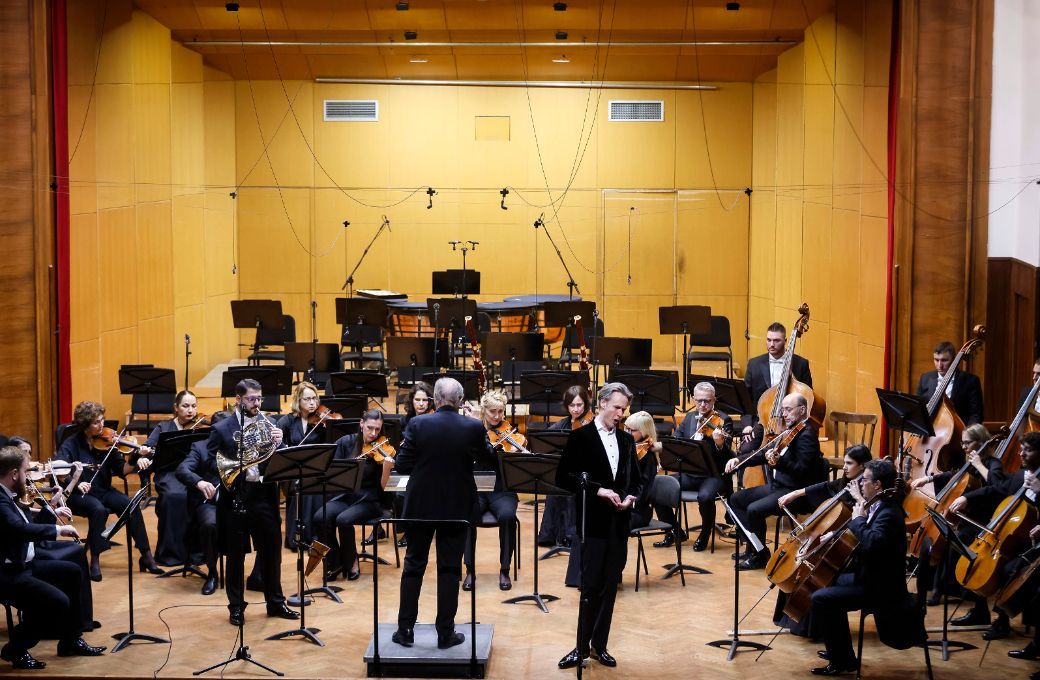A late change of programme meant that the Belgrade Philharmonic Orchestra’s latest concert, with Anglo-Swiss guest conductor Howard Griffiths, became an all-English evening. The advertised Mozart was replaced with Elgar’s Salut d’amour, providing a gentle, tuneful opener which elicited smiles all round the Kolarac Hall.

The second piece was much darker. Britten’s Serenade for tenor, horn and strings sets six poems connected by the theme of night, encompassing shadows, moonlight, danger and sleep. Ian Bostridge (making his Belgrade debut) is a renowned interpreter of this work, but this is a piece with two soloists. Bostridge was joined by Nikola Ćirić, principal horn player of the Belgrade Philharmonic, who showed that he was every bit the tenor’s equal. His demanding solo prologue left us in no doubt that this was going to be a special performance. Throughout the work, Ćirić shaped his playing to complement or contrast with the singer. His playing conjured up the sinister atmosphere of the Elegy as much as the singer’s words. Bostridge used his long experience of performing the Serenade to communicate the meaning of the poems (necessary as no texts were provided). Beauty of sound was the horn player's role; Bostridge interpreted the songs through a wealth of expressive means. The Dirge was stunning, with Bostridge almost shouting at times, contrasting with the glorious, mellow sound of Ćirić’s horn. The lighter tone of the Hymn (to Diana, goddess of the moon) was welcome relief. Both soloists built a strong rapport with the audience. The pair were constantly supported by the fine strings of the orchestra until the epilogue where Ćirić resumed his solo from the prologue, now offstage.
The second half of the concert was devoted to Vaughan Williams’ Symphony no. 5. Vaughan Williams, even more than Elgar and Britten, is relatively infrequently performed in continental Europe, but if his music does not travel well, no one has told the Belgrade Philharmonic. In the hands of Griffiths, a frequent visitor to Belgrade, we had a fine performance of this amazing symphony, which may be quintessentially English or else totally international, depending on the listener. In a brief introductory talk to the audience, Griffiths suggested that we might feel ourselves transported to the English countryside. Great performances of this work that I have heard in concert halls in Manchester, Liverpool and London came to my mind, and this evening’s performance was their equal.
The opening Preludio is a substantial movement, much more than a prelude to what is to come. Griffiths conjured up a beautiful landscape, peaceful but with a sense of threat behind it, which became a key feature of this performance. The second movement scherzo was delicate and quiet, but again with sinister undercurrents expressed though unexpected sudden outbursts and an abrasive central section. The calm, restful Romanza was the heart of the work (with some fine solos from the leader of the orchestra and others). The finale began calmly with the smooth, string-led sound so typical of the composer, increased in intensity and finally led to a radiant conclusion. The symphony was written during the Second World War and first performed in 1943. It was a war symphony in a sense, but one that was imbued with hope for the future which came across strongly in this performance. The intense climaxes in particular built up inexorably, but never erupted into anger or violence. Rather, there was an unassuming confidence and warmth and one came away feeling satisfied and positive. The Belgrade audience loved it.


